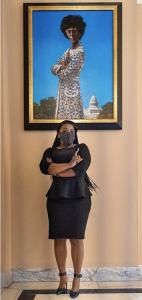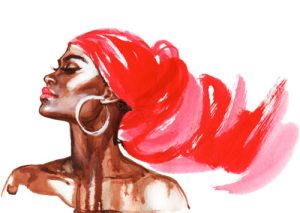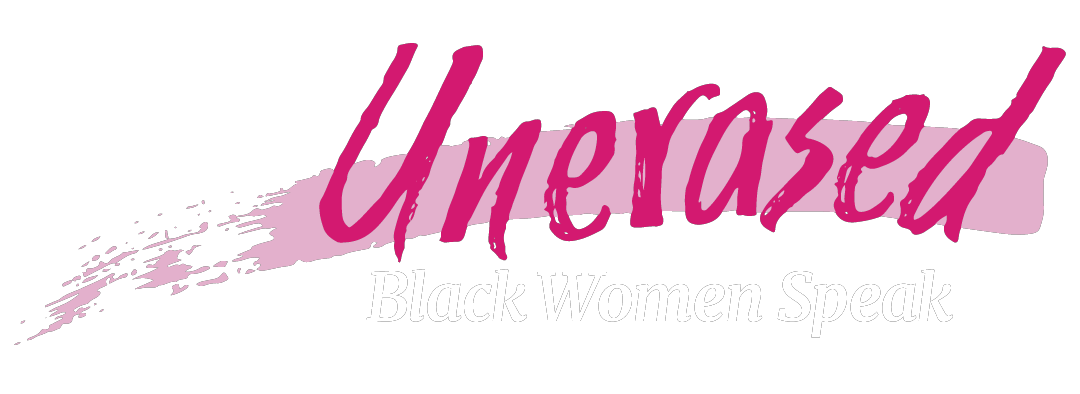
Imagine it’s your first day at your dream job as a public servant.
You’ve worked hard, you’ve studied, you’ve honed your craft, and now you are being recognized for your dedication. Your new employer has awarded you the opportunity to put your talent and skills to good use to create a better, more equitable society.
When you walk into your office, a small smile plays around your lips as you realize how often you’ve envisioned this moment in your wildest daydreams. You fight the urge to pinch yourself because everything you’ve wished for has finally become your reality. Ready to roll up your sleeves and work to ensure justice, equality, and full autonomy for all Black people in this country, you sit behind your desk and take in your new surroundings.
Images of the powerful women who made this opportunity possible for you slowly flow through your mind. You imagine how Shirley Chisholm, Maxine Waters, Karen Bass, Sheila Jackson Lee, Barbara Jordan, Cynthia McKinney, Lucy MacBeth, Cardiss Collins, Val Demings, Kamala Harris, and the 37 other Black congresswomen felt when their journeys began. Your heart fills with pride as you realize your name will be etched in history alongside these illustrious, celebrated, and historical women. The work that you do will always be directly connected to them and their remarkable legacies.
After you’ve organized your office, you make your way to your new hire orientation, still feeling heady from the realization of your accomplishment. You pass a few of your GOP colleagues in the halls of the capitol building who smile at you welcomingly. Initially, this shocks you because you are well aware of the treatment Black women in congress have received from the other side of the aisle, however, these people appear friendly and are motioning for you to join them.
As you get closer, you immediately come down from the clouds and suddenly feel as if you’d traded in your dream for a nightmare when someone from the group approaches you and says:
“Breonna Taylor! So nice to meet you!”
Breonna Taylor’s murder was not noteworthy for all members of Congress.
This was Congresswoman-Elect Cori Bush’s introduction to life on Capitol Hill as the first Black woman to represent Missouri. Known for her activism, her title as a pastor of the church she founded in St. Louis, and her career as a registered nurse, Bush is no stranger to acting in the capacity of a dedicated public servant. Her passion for justice for the Black community, notably in the wake of Michael Brown’s death, propelled her to run for congress. As a representative, she felt she would have a greater opportunity to improve the conditions for marginalized people of color in Missouri and throughout America.
When the news of Breonna Taylor’s violent murder at the hands of Louisville police officers made headline news, the Black community along with most of the country joined together in protest to assure that the officers would be brought to justice. Bush was one of the outspoken activists who used her platform to bring attention to this horrific crime. She joined Black Lives Matter in Kansas City where she and others spoke out against police brutality and rallied to bring change to protect Black lives. She has also been photographed multiple times wearing her Breonna Taylor mask to show her commitment as an advocate for Black women and her solidarity for the movement.
Most Americans with a pulse know of Breonna Taylor’s horrific death. However, it appears a few members of the GOP somehow missed the entire story — that often ran as headline news on most major media outlets— of the 26-year-old EMT who was tragically killed by police in her own home.
Black women’s lives are inconsequential to some White Americans.
When Cori Bush came forward to give the details of her colleagues mistaking her for Breonna Taylor simply because she wore a mask bearing her name, it was a sad reminder of the erasure and lack of regard for Black women in this country. It would be rare to find a person over the age of 35-years-old who wasn’t aware of the deaths of Laci Peterson or Natalie Holloway and even more bizarre for any woman alive to be mistaken for either woman since their stories were widely discussed and analyzed.
When a White woman is murdered or goes missing, it’s typically featured first on every medium, it’s the top priority of the judicial system to bring the culprits to justice, and it’s usually a popular topic of conversation in a wide variety of circles. However when the victim is a Black woman, our communities must push and protest to get adequate and effective media coverage. It has long since become painfully obvious that the value of a Black woman’s life has never equaled that of her White counterparts, even after 400 years of our presence in this country.
The message sent to Black women and girls when our lives are disregarded.
To be confronted with the fact that your existence carries little weight or importance in the eyes of those around you makes it difficult to develop and maintain a consistent sense of well-being. The psychological effects on Black women and girls from being one of the most neglected members of this society can cause long-term and sometimes permanent consequences on our quality of life.
Researchers from Northwestern University conducted a study of seventy-two low-income Black women in the Chicago community of Oakland who exhibited symptoms of depression. Thirty percent of the women in the study were subsequently diagnosed with PTSD due to either witnessing or being victims of a dangerous event. This was just one study, but it would be safe to assume that this community is not the only one where traumatized Black women live. That said, coupling pre-existing psychological conditions caused simply by living while Black with the knowledge that our lives could be viciously taken and go unnoticed by the majority of society does nothing to foster a sense of peace and comfort for Black women.
The GOP representatives who mistook Cori Bush for Breonna Taylor piled multiple extra layers of trauma onto the backs of each Black woman who heard the story. We are often the targets of this type of indirect stress when White people make careless comments about us without realizing the residual effects of their words. The damage caused by this type of disregard has even led some of us to attempt to become immune to these situations. Those who choose this route don’t do so because they don’t care, but instead out of the necessity to create an invisible wall of defense to protect their psyches.
The fact that a Black woman would even need to consider turning a deaf ear and blind eye to egregious acts committed against her community, simply because the frequency of those events were harmful to her mental health, further punctuates the sad state of affairs in this country. That blind eye is often the only thing that saves us from coming face to face with the fact that America was never designed to protect and respect the Black woman.
But eventually the stories catch up with us one way or another. When this happens, it can create emotions as strong as the pressure caused by the release of water from a broken levee. And like the water, the emotions are impossible to contain and come with the capability of damaging all aspects of our lives. The tragedy is that we aren’t even responsible for the events that led to our suffering and those who inflicted the pain are the first to ignore our gaping wounds.
How could members of congress be unaware of a nationally covered crime in America?
When a Black woman is victimized, it can easily go unnoticed. Our communities have to march just to start the wheels of justice against the perpetrators of wrongful acts and murders committed against us. But even if we are successful enough to get an arrest or conviction when one of our own has been killed or goes missing, the attention span of White America is so short that our devastation is easily forgotten. Those who see no value in Black women quickly “turn off” and turn away from news that doesn’t involve their immediate circles.
Although the dismissal of acts of violence against Black women is certainly nothing new, this recent despicable act by GOP members is a frustrating and painful reminder of how our lives rank among the lowest priorities of most of White America. Breonna Taylor was the daughter of a woman who loved her unconditionally and has grieved just as much as any other mother in the world who lost a child. Her pain isn’t any less just because she is a Black woman. Does she not deserve the same outpouring of compassion and kindness from all Americans that was given to the mothers of Laci and Natalie? Was Breonna’s life not worth recognizing? Was she not worth acknowledging? Did she not deserve to be mourned and revered like other women of the dominate society who also lost their lives?
Sadly, the answer from some members of White America is a resounding no, and the assumption from the GOP members that didn’t know who Breonna Taylor was loudly affirms that conclusion.
We must affirm our presence and our worth in this country and around the world relentlessly.
There is comfort in knowing women like Cori Bush will have a seat at the table on Capitol Hill to bring issues that directly affect Black women to the forefront. This does not, however, excuse or negate the blatant racism or lack of regard for Black women in our government or in this country as a whole.
We have been underestimated, stepped-over, pushed to the back, disrespected, and out-right ignored by this society for hundreds of years. Our lives have yet to share the same value as White women and we have contributed entirely too much to the growth and progress of America to accept this slap in our faces.
Just as Cori Bush made a point to call out the GOP representatives whose insensitive, out of touch, racist and cold-hearted behavior caused her trauma, we must also call out any transgression committed against us. Our voices have been magnified over the past few months, but we all know that there is a limited window of opportunity to make strides in racial equality in this country. Soon, White America will be “back to normal.” In fact, a great deal have already resumed their regular lives and blocked out the plight of Black people. But as long as we continue to speak up and speak out about what we experience and what we see, we can keep this vital conversation at the forefront. And the more we tell our stories, the more humanized our lives become through the eyes of those who have been born and bred to only care for their immediate communities.
Cori Bush’s statement about what happened to her on the first day of her dream job sums up the sentiment that should be adopted by every person in the world:
We have to know what is happening in our communities. Not only our communities, but what’s happening in other communities, because that is how we keep our people safe. — Cori Bush, Congresswoman-Elect
Originally published on Medium.
Poems




